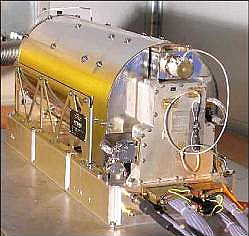SELEX Galileo... You Can Set Your Position By It (Satellites)
[SatNews] With a frequency stability equivalent to 1 second every 3 million years, the Passive Hydrogen Maser (PHM) is the most stable operational atomic clock for Space use ever built.
The
Maser was developed by
SELEX Galileo, a
Finmeccanica company. The
European Space Agency's
Galileo constellation will have SELEX Galileo's PHM atomic clocks on board. With exceptional stability and on-ground positioning precision of up to 30 cm, SELEX Galileo's Maser will guarantee the Galileo constellation can deliver highly precise navigation data, without synchronisation from ground control for over 8 hours. With SELEX Galileo’s PHM, the Galileo constellation’s positioning output will be almost 10 times better than the other currently operational satellite systems.
 Photo of the Company's Passive Hydrogen Maser (PHM)
Photo of the Company's Passive Hydrogen Maser (PHM)
The Maser atomic clocks are fitted on-board all of the Galileo constellation's 30 satellites. Each satellite also has a range of other SELEX Galileo technology integrated on board including the
IRES-NE asset sensor (2 on each satellite) and the
Electronic Power Conditioner (
EPC) of the 7 SSPA covering 3 bands (from 1,19 to 1,57 GHZ) for the transmission of the satellite signal. Currently, SELEX Galileo has ongoing contracts with the European Space Agency (ESA), with funds from the
Agenzia Spaziale Italiana (
ASI) and
Italian EU funds, for the development, engineering and manufacture of the pre-flight and flight Maser units. The Company is also developing a compact, low power consumption version of the Maser (the
Mini-Maser), also for space applications. Swiss company
SpectraTime is the principal subcontractor for the Maser. SELEX Galileo currently has 20 highly skilled technicians involved in the project, producing and testing the Maser systems. The Company is expecting to match its investment of financial and human resources in the next phase of the program.
Topical Tags :
Regional Tags :



